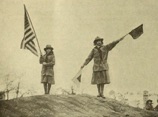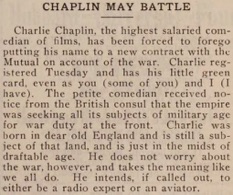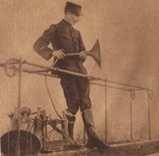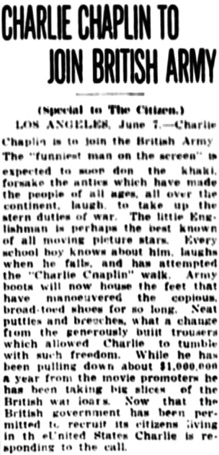The Immigrant Clippings 1/72
Washington Post, Washington, D. C., April 5, 1917.
CAMP FIRE GIRLS PICTURED IN „REEL LIFE.“
Some time ago the Gaumont Company was praised
by exhibitors for its timely pictures of Boy Scouts.
When one considers the fact that millions of people are
interested in this organization because they have
sons in it or else realize the worth of the movement and wish
to understand how it works the widespread appeal
of such pictures is readily understood.
Only next in importance to the Boy Scout movement
is that of the Camp Fire Girls. While they may not
be as active, they are certainly as ardent, and their pictures
should receive the same welcome everywhere.
It was wise judgment on the part of Gaumont to reserve
space for them in „Reel Life,“ the Mutual Magazine
in Film. A section of No. 63 is devoted to their activities as they
study to „do their bit“ for their country. The picture,
which is called „Camp Fire Signal Girls,“ shows an army sergeant
giving lessons to a bevy of girls in wigwagging,
heliographing, and other methods of rapid communication. The
picture should prove very popular on the screen.
(...) Scene from „Reel Life No. 63,“ Moving Picture World,
July 7, 1917
& This frenchman is operating from a roof top one of the
powerful sirens that warn Paris of a coming air raid.
(...) Int. Film Photo, New York Tribune, Nov. 11, 1917
& CHARLIE CHAPLIN
TO JOIN BRITISH ARMY
(Special to The Citizen.)
LOS ANGELES, June 7. – Charlie Chaplin is to join the
British Army. The „funniest man on the screen“ is
expected to soon don the khaki, forsake the antics which
have made the people of all ages, all over the
continent, laugh, to take up the the stern duties of war. The little
Englishman is perhaps the best known of all moving
picture stars. (...) Now that the British government has been
permitted to recruit its citizens living in the United
States Charlie is responding to the call.
(...) Ottawa Citizen, Ottawa, Canada, June 8, 1917
& CHAPLIN MAY BATTLE
Charlie Chaplin, the highest salaried comedian of films,
has been forced to forego putting his name to a
new contract with the Mutual on account of the war. Charlie
registered Tuesday and has his little green card,
even as you (some of you) and I (I have). The petite comedian
received notice from the British consul that the empire
was seeking all its subjects of military age for war duty at the
front. Charlie was born in dear old England and is
still a subject of that land, and is just in the midst of draftable
age. He does not worry about the war, however,
and takes the meaning like we all do. He intends, if called
out, to either be a radio expert or an aviator.
(...) Screamer, June 9, 1917
„AT WAR“
Editorial content. „UNITED STATES AND GERMANY
AT WAR, SENATE DECLARES BY VOTE
OF 82 TO 6; HOUSE WILL CONCURE TODAY“
Front page.
Redaktioneller Inhalt
Alan Nevins & Henry Steele Commager, The Pocket History
of the United States, New York 1942: „In the presidential elections
of 1916 Wilson was successful, largely because he had ,kept
us out of war.‘“
He Kept Us out of War. That‘s his campaign slogan.
The fighting in Europe dominates the campaign. Woodrow Wilson campaigns for re-election on a pledge of continued neutrality
in the World War One
Election night is on November 7, 1916. The electoral vote
is one of the closest in American history – with 266 votes needed
to win, Wilson takes 30 states for 277 electoral votes, while
Hughes wins 18 states and 254 electoral votes.
After the sinking of seven U.S. merchant ships by submarines
and the publication of the Zimmerman telegram, Wilson
calls for war on Germany, which the U.S. Congress declares
on April 6, 1917.
Am 28. Juli 1914 hat der Erste Weltkrieg begonnen –
„the european war“ wird er oft in amerikanischen Zeitungen
vorerst noch genannt. Am 7. November 1916 gewinnt
US-Präsident Wilson die Wiederwahl. Sein Slogan –
He kept us out of war – ist erfolgreich. Am 6. April 1917 ruft
Wilson aber zum Krieg gegen Deutschland auf.





